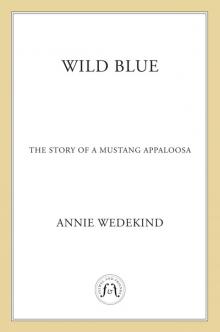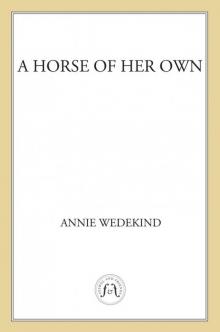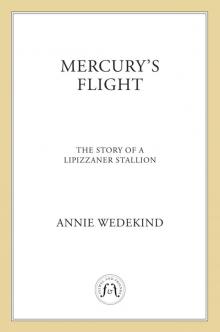- Home
- Annie Wedekind
Samirah's Ride Page 4
Samirah's Ride Read online
Page 4
“And your father has told you ad nauseum that an eleven-year-old girl has no business getting on an unbroke horse,” Jasper’s mother said.
“But what he’s doing isn’t working—everybody can see that! It’s just the same over and over. . . .”
“Are you telling me you know more about starting a horse than your father does, young lady?”
“She’s my horse, Mom!”
This, too, was a conversation I had heard before.
Jasper jumped up from her seat and ran into the house, leaving her parents alone on the twilit back porch facing the fields. In her absence, the conversation shifted.
“If things don’t pick up, I’m afraid we’re going to have to sell some of the horses, Gloria.” Red’s voice was somber.
“I know,” Miz M replied softly. “But let’s give it another year—another summer. We can afford that.”
“Barely,” Red grunted. “Probably if we put in some kind of spa, people would come. I don’t know how many folks want to come and just ride and fish anymore. Seems like we’re too rough around the edges for most.”
“A spa . . .” Miz M’s voice was amused. “Well, I could make mud wraps out of cow patties. Teach Bull how to do pedicures.”
Red’s laugh echoed across the field.
“Peach could be the yoga instructor,” Miz M continued, “and you could . . . um, you could . . .”
“Move to another state.”
Most of this was over my head, but their laughter—and there was a lot of it—comforted me, even as I fretted over Jasper’s tears.
. . .
The moon was high above the fir trees and the herd had settled into the deep quiet of the darkest part of the night when a familiar sound broke through my dreams. At first I thought a wakeful robin was disturbing the peace, but then I pricked my ears and heard the whistle clearly: Dee dee dee dee. Jasper!
It had been a long time since she’d visited me this late, and curiosity put extra speed in my stride as I trotted toward the gate. I could just make out her small shadow perched on the fence, her hair swinging over her shoulders as she leaned toward me. Dee dee dee dee, she whistled again. And then I was by her side, our faces at the same height, and I took the carrot she held between her teeth, my muzzle grazing her cheeks. We both gazed out to the dark field, to the yellow moon furred in the humid, late-August sky.
“It’s all right, Sami,” Jasper said quietly, her small fingers tangling through my mane. I wasn’t sure what exactly was all right, but I liked hearing her say it. Despite her words, I felt tension—excitement—in her body, her hands. Jasper often radiated this kind of energy, and I was accustomed to it.
“Let’s get your bridle on,” she suggested in the same tone. And before I could wonder at her words, she slipped the leather straps over my ears and had the bit in my mouth. I didn’t mind the bit, though Red wouldn’t let me graze while wearing it. If Jasper wanted to go for a walk, I wished she’d chosen the halter. But Jasper showed no sign of leaving her perch on the fence, so I stood quietly, poking at the bit with my tongue and wondering what we were going to do next.
Jasper gave a gentle tug on the bridle and asked me to move nearer to the fence. I complied, and then I felt her hands across my back, stroking my withers, my barrel, my hindquarters. It was like a nice grooming without a currycomb, and I relaxed into it, leaving the bit alone and just enjoying Jasper’s presence at this unusual time of night. The air was so soft it seemed to have lulled the woods and trees and everything in them to silence, to dreams. I was getting a bit dozy myself when I felt a very slight pressure on my back. I turned my head and saw that Jasper had placed one of her legs across the small of my back, as if I were a footrest. It wasn’t very dignified, and Jasper didn’t look all that comfortable, but if that’s how she wanted to sit, it was fine with me. I sighed and resumed my contemplation of the night.
Jasper shifted her leg and put her hands on my mane—what was the girl up to?—and I put my weight on my left foreleg to keep my balance.
“It’s okay, Sami, everything’s okay,” she said in the low, singsong voice she used when I was nervous. But I wasn’t nervous now, though Jasper’s legs seemed rather heavier and she was clutching my mane a little too tightly for comfort. I decided to walk up a step or two to ask her to lighten up her fingers. It worked—she released my mane and patted my neck. I felt a slight pressure on the bit and stopped.
“See, Sami,” Jasper laughed shakily, “this isn’t so bad.” Her voice came from directly behind my head.
And that’s when I realized—it wasn’t Jasper’s legs on my back. It was Jasper herself.
I froze. My body turned as rigid as the fence, except for my ears, which flickered back and forth in a frantic search for more information. I could hear Jasper taking deep breaths—it sounded like she was gulping the air. I swiveled my eyes back but I couldn’t see all of her, just the points of her boots dangling at my sides. My mind raced as I tried to put together the pieces of feelings and instincts thrilling through me—stay perfectly still . . . Run! . . . Wait and see what she does next. . . . Run! . . . She is so much lighter than Red. . . . Don’t move a muscle. . . . If I move . . . if I move, what? She’ll fall? I’ll fall? Her weight will hinder my escape? And what am I escaping from? Certainly not from Jasper. She’s . . . well, she’s simply Jasper. I must not hurt her. She never, ever hurts me. Would she hurt me now? Would Jasper ever hurt me? Would she put me in danger? This weight . . . Run! Run! Can I run? This weight is Jasper. It’s Jasper. Who would never hurt me. And I can run.
I had to. I had to run to release my feelings, to test the weight, to see what I was when I was a horse under a rider. For just as humans are transformed by being astride a horse, we horses are transformed, too. We become, for our companions, more than horse, like Magpie and Sunny. Perhaps you think that horses were made to be ridden—that this sort of thing comes naturally to us. It should tell you something that even I, Samirah, Arabian mare bred to carry kings, had to dig deep for the courage to bear this strange—oh, strange, though so familiar!—weight.
So I ran. I could not contain myself—either the fear or the joy that propelled me forward in equal measure. I felt Jasper slip backward, her weight shifting toward my hindquarters, and I found myself naturally compensating with my stride, trying to keep us both balanced. The reins flapped against my neck, then tightened so I could feel a delicate tension communicating the words of Jasper’s hands to my mouth. She had steadied herself, and she wasn’t asking me to stop. I felt her legs grip my sides firmly, and after a few more strides, her seat settled down to join my back, moving with me. Moving with me! It was so strange, to have this small human, my own human, running along with me through the sweet, dense summer night! I always came to Jasper, followed Jasper, moved around Jasper—now she was moving with me! It was companionship. I finally understood it.
The shift from fear to wonder, wonder to joy, burst over me as if the sun had suddenly shot out from behind the fence of trees. I felt confidence rippling through my limbs, through the muscles of my body. I flared my nostrils to take in every particle of the soft, night-scented air, snorting loudly and throwing my tail high behind me, the streak of this new comet, new constellation, that was Jasper and Me. Jasper gave a gasping laugh as I bounded forward, delirious with my own speed, with the bewildering intoxication of running for the first time not alone, not side by side, but with another creature, as one. I knew at that moment that we would never part. That I would never be alone. And that, for a horse, is the greatest thing of all.
“Okay, Sami, whoa, girl, whoa!” I felt pressure on my mouth, not sharp, but steady, and I reluctantly shortened my stride, then dropped to a trot, and finally to a walk, shaking my head and trembling a bit as I came down from the run. Jasper was laughing, a high, breathy, exultant sound, and she stroked my neck over and over again, praising me.
“I knew you were just waiting for me, Sami! You’re the best, most beautiful, smartest, fastest . . .�
�� Her words trailed into the night. I found myself relaxing by degrees, my breath evening, my mind and body settling. By the time we reached the gate, I was practically sauntering. Jasper held the reins loosely, and her legs swung free from my sides. We walked quietly, companionably, through the dark.
A flare of light and a bark of sound broke our reverie.
“Jasper Munk, what on God’s great green earth do you think you’re doing?!”
I threw my head sharply and stopped. There by the gate, illuminated by the glare of Red’s big flashlight, stood Jasper’s parents, fury flowing from their bodies and voices.
My instinct was to run, and so was Jasper’s. I felt her body shift to the right, as if about to ask me to turn around, but then she stopped and recentered herself. I felt her stiffen her back and square her shoulders.
“I am riding my horse,” she replied.
CHAPTER 5
Know ye there exists a mare
Swift
With highborne silken tail
If I remember correctly, Jasper was practically chained to the house for about a month, given the worst of the chores, lectured so often that I began to flee the sound of Red’s cantankerous, self-righteous voice, and generally made to feel like a criminal.
But what her parents couldn’t do was stop her from riding me. After all, as Jasper argued smugly, she had to continue my education or risk losing the gains she’d made.
And that made Red angriest of all. Or proudest, depending on how you looked at it.
For he could not deny that his daughter—his small, freckled daughter no bigger than a wildflower—had done what he could not. To Jasper and me, it was obvious. For Red, it was both maddening and miraculous. I had never smelled such fear as his and Miz M’s when they discovered us that night, and it took some time for that fear—and the anger it caused—to molt away and reveal pride.
So it was with mixed feelings that Red watched over us, as anxious as a new broodmare, until eventually even he could not deny that Jasper was safe with me. That I had finally made the leap to be more than horse for my companion.
More than horse? After a while, she became more than rider. It seemed we could do anything. With Jasper’s imagination and my natural abilities, the games of the paddock took flight. Each month seemed to bring a new story, a new trick or skill to learn. First she thought she’d train us for the rodeo, and we spent hours racing around makeshift barrels, chasing calves, herding the other horses (I enjoyed that—especially when I got to boss Magpie into a corner so Jasper could rope her). Then Jasper wanted to try trick riding, and terrified her parents by learning how to stand on my back at a canter, to leap aboard by jumping over my hindquarters, to ride backward, sideways, and occasionally upside down (though that was usually in error). She was utterly fearless, and I made certain that she had every reason to be.
But she still could sense when I was having an untrained sort of a day, and those mornings we simply ran, as fast and as far as I desired.
Our range increased to the edges of the ranch and to the land that lay beyond it. Jasper, of course, was supposed to stay within its confines, which were large enough but not always large enough for us. I discovered that there were mountains beyond our mountains, the gentle curves that encircled the grassland, dusty brown and green with pines in summer, snow-tipped in winter, forming the comforting perimeter of our world. The beyond mountains were higher, harsher, thinner at top and rough sided. They plunged down to a mysterious landscape, far from our eyes, and a colder air seemed to blow from their direction. We followed the river, swam at the calm crossing where Jasper’s ancestor had once sailed his ferry, and searched for the outlaws’ cave. We kept riding the border of our known world, galloping its very rim.
. . .
It was the next spring when they started taking the herd apart.
Irish—last, besides me, to arrive—was the first to leave. Buck had been wild all morning, galloping the fence line, then breaking back to corral the mares tightly together, jostling and bruising in his frantic attempts to keep us in one safe pack. I resisted to the best of my ability, the rest bore his mood in silence, and Magpie just stared at him. Finally, after receiving a painful nip near my tail, I bolted away as fast as I could, running for the nearby creek. I could hear Buck start after me, but with another spurt of speed, his hoofbeats were silenced. I waited awhile before venturing back, hoping his mustang mood had passed. By the time I rejoined the group at the fence, Irish was already in the trailer. The squeals coming from the barn told me that Buck had had to be confined to his stall.
I glanced questioningly at Magpie, then back to the trailer, where I could see Irish’s head turned as far as possible toward us.
Leaving, Magpie told me. This is good-bye.
Good-bye, good-bye, good-bye . . . Our neighs sounded back and forth, down the fence, from the trailer, now churning up clouds of dust, and from the barn in Buck’s desperately sad whinny. Good-bye, good-bye.
It is a difficult thing for a herd to lose a member. As horses, we are at once ourselves and parts making up a whole. The completeness and safety of our herd deeply affects us as individuals, just as the herd as a group is impacted by the health and disposition of each horse. We are, I suppose, like a human family, only more so.
I mourned the loss of Irish. I missed her calm presence, the sense of contentment and acceptance that you could not help but feel when you spent time with her. I hoped that the next place, her next herd, was kind to her. I wanted so much for her to have good fortune . . . perhaps because I suspected she hadn’t in the past. That made me sorrowful—the idea that Irish might go to an unhappy place. It made the footing of our world seem slippery, uneven. And there were more good-byes to come. Eventually, even Buck grew accustomed to them.
Miz M, Bull, and Peach took the loss of the horses stoically, but Red and Jasper seemed to feel the succession of rattling trailers as body blows.
“It’s not the end,” Miz M would calmly remark, wiping her forehead with the back of her arm and gazing at Jasper with the clear, gray-blue eyes they shared. But Jasper’s eyes were as dark as storm clouds, her lips pinched together in a line as thin as Red’s. Father and daughter stalked the ranch with identical stiff, slow gaits, as if hunched under bad weather. But Miz M still whistled, Miz M still sang. I liked hearing her voice from the kitchen window as she baked bread and washed vegetables. She reminded me of Irish.
The worst day was when we lost both Julep and Bull.
“I can’t pay you all that I owe you, but I can give you your horse,” Red told Bull. Jasper didn’t know what to cling to hardest—Bull’s slim waist or Julep’s brown neck. They didn’t need a trailer—Bull packed the saddlebags, put on his hat, and mounted his horse.
“Now this should make you happy, Jasper,” he said, trying to laugh. “Ain’t this just like the old days? Cowboy riding off into the sunset?”
Jasper couldn’t speak. She just stroked Julep’s shoulder and held on to Bull’s boot until they had to go, and we all stood and watched them trot down the drive and over the cattle guard and out onto the road. Then Jasper and her father walked like old men back into the house, and that day Miz M didn’t sing.
. . .
By autumn, the herd had been reduced to Magpie, Chief, Buck, Sunny, and me. Even the Artful Dodger was gone, and in his case I was glad. We had all gotten an eyeful of the boy he now belonged to—small and sprightly as a water bug, with a whooping holler ten times his size—and he seemed like exactly the right companion for a pony like Dodger. I missed my friend, but I suspected he was happy.
We adjusted to the changes. At first the herd seemed like a ragged thing, with great holes where Julep, Cricket, Dodger, and Irish had been. (No one missed Zelda, who had been sold as a broodmare. Maybe a passel of foals was just what she needed, though I for one would not have wanted that mare for my dam.) But by the first snowfall, we had sorted ourselves out and were content again. Magpie was the uncontested leader, I was her second a
nd Chief the third, and Sunny and Buck played their parts as grandfather and stallion. It was peaceful, having such an orderly and firm hierarchy. I was the only one who caused trouble.
Just as I had untrained days with Jasper, I had disobedient days with Magpie. I am the youngest of the herd, and I am proud. Sometimes I simply must break free from my bonds, show off my speed, my agility, ignoring Magpie’s annoyance, stirring up Buck and even Chief to chase me over the fields. I feel such a mixture of things . . . both wanting to be a filly again, without rank or responsibility, and wanting to challenge Magpie, to be first in the herd. The combination makes me wild and restless, and unsuitable for company. It’s an odd coincidence that as Jasper reached her twelfth birthday she seemed to be feeling the same way. With the loss of half the herd, and of Bull, she had aged, and the burdens of the ranch hung heavily on her thin shoulders. She and Red would take me and Magpie out to check for broken fence (an endless chore), and they would discuss Cold Creek and its future. Mostly Red’s voice was casual, reassuring—We’ve had to make changes, but we’ll see it through, he’d say. Or: You don’t need to worry, Jasper. Leave all that to your mother and me. Or: You’ve got enough to think about with school and training Sami. But I could tell she didn’t believe him. Didn’t believe that he wasn’t worried, didn’t believe that it wasn’t her place to help and to worry with him. I could feel tension in every part of her body that touched me, and at times it set me on edge.
But then there were mornings when Jasper came to fetch me before sunrise and we struck off on a new trail, abandoning the ranch and her chores for the entire day. She’d be in trouble when we got back, but that’s how things are on an untrained day . . . a day when you need to slip free from your bonds and be as irresponsible as a foal. Our breath made clouds and we ran for warmth—I am as surefooted in the snow as I would have been on the sands where my ancestors raced, and Jasper as light and agile as any Bedouin boy. Two young girls who wanted trust and respect at the same time that they were running away from it. At least we had each other.

 Wild Blue - The Story of a Mustang Appaloosa
Wild Blue - The Story of a Mustang Appaloosa Little Prince - The Story of a Shetland Pony
Little Prince - The Story of a Shetland Pony Samirah's Ride
Samirah's Ride A Horse of Her Own
A Horse of Her Own Mercury's Flight - The Story of a Lipizzaner Stallion
Mercury's Flight - The Story of a Lipizzaner Stallion